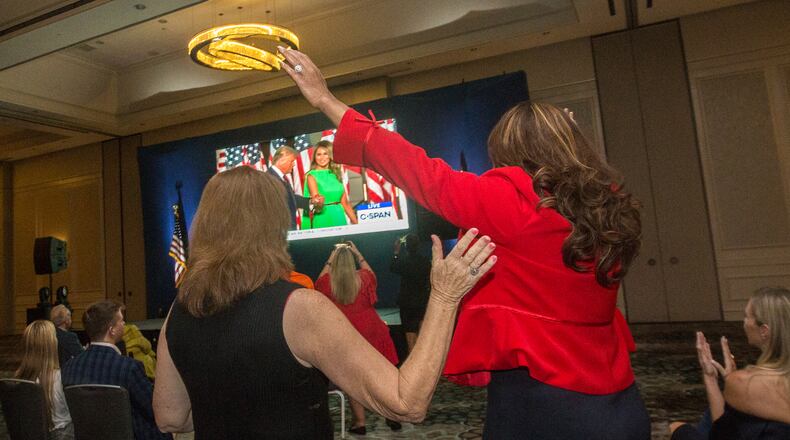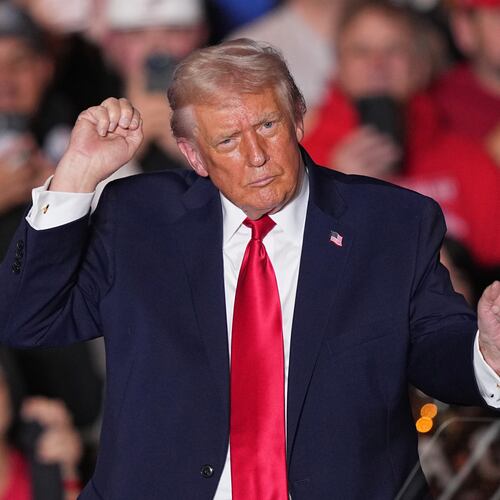After Stacey Abrams’ narrow defeat in 2018, Georgia Democrats were poised to vastly expand her strategy of mobilizing a small army of door-knockers to make personal contact with voters — and Republicans were worried about keeping pace.
But the coronavirus pandemic has flipped the script. Republicans have amassed a legion of canvassers making in-person appeals to likely supporters. And Democrats are scrambling to beef up digital measures to target Georgians in more unconventional ways.
The shift in approaches to door-to-door campaigning will come into sharper focus with the post-Labor Day campaign pushes by President Donald Trump, former Vice President Joe Biden and their Georgia supporters.
Instead of an intense focus on face-to-face meetings, Democrats are now relying on virtual gatherings, phone calls, text messages and other digital appeals. Republicans, meanwhile, returned to the streets in June and are crowing about a vast expansion of their efforts.
It’s a risky strategy for Democrats, who say they have little choice to avoid spreading a disease that has killed roughly 6,000 Georgians. It also evokes one of the centerpieces of Biden’s 2020 message — a contention that Trump’s mishandling of the disease has cost American lives and ransacked the nation’s economy.
“We have to, as Democrats, remain vigilant through this particular process. We’re not in a position to put folks in danger, in harm’s way,” Simone Bell, one Biden’s senior advisers in Georgia, told a group of digital organizers in a recent training session.
“We have to be really smart about how to do this work. The good thing is, we have enough people on board, we don’t have to be afraid,” she added. “We’ve got this, y’all.”
Republicans, who maintain a small lead in recent Georgia polling, say the return to in-person events gives them a formidable advantage in a state that they’ve held in presidential contests since 1996.
“You can only hide so long. The public begins to notice that they haven’t seen you,” said former Gov. Nathan Deal, among more than 100 who crowded into a Gainesville restaurant for a recent GOP campaign event. “And that will pay dividends for those who have been willing to get out and meet people.”
‘Really innovative’
It wasn’t supposed to be this way for Democrats.
If there was a defining theme to Abrams’ near-miss in Georgia two years ago, it was her embrace of unconventional approaches to campaigning that relied more on a sprawling staff of canvassers and organizers who proclaimed her message to “unlikely” voters.
And Georgia Democrats were eager to build on that blueprint in 2020, with plans to hire droves of grassroots staffers to fan out across the state to make personal appeals for their candidates.
Both parties essentially halted traditional campaigning in March as the coronavirus pandemic spread and Gov. Brian Kemp imposed statewide restrictions. But while Republicans resumed traditional campaigning as the regulations eased, Democrats have stayed away.
The leading contenders for the state’s two U.S. Senate races, Jon Ossoff and the Rev. Raphael Warnock, haven’t held in-person campaign rallies for months, instead resorting to virtual town halls, dozens of media interviews and remote press conferences. On Friday, Warnock announced a return to face-to-face campaigning, with a socially distanced “Georgia Voices” tour that kicked off over the weekend.
And instead of spending nights and weekends going door-to-door, most Democratic candidates have searched for other ways to reach voters. So has Biden’s campaign, which tallied more than 2,400 virtual events across the state that include training sessions, community events and online house parties.
“We know the data tells us the most effective way to influence voters is to talk to them one-on-one. But we’re a party that puts safety ahead of everything else,” said Stacia Yim, the state Democratic Party’s digital organizing director.
At an online training session, Yim encouraged Democratic activists to promote Biden through other means: social media apps, texting chains and personal — if remote — appeals.
“This,” she said, “gives us an opportunity to get really, really innovative.”
“We've found that these virtual events have allowed us to reach even more coalitions statewide, provide more intimate trainings and phone banking sessions and expand our bank of digital community events."
‘Got to go out’
At Republican events across the state, a sense of normalcy has returned. Well, somewhat.
Hundreds have crowded recent in-person rallies for U.S. Sen. Kelly Loeffler and her top Republican rival, U.S. Rep. Doug Collins, at restaurants and event spaces throughout Georgia.
Organizers screen the temperatures of participants and urge those with symptoms to steer clear. But they don’t require face coverings, and many attendees at a half-dozen recent events don’t wear masks.
“We’ve got to go out. Our ground game is getting stronger every day, and we’re just getting ready for our main push,” Collins said. “It’s going to be close, and we’re going to fight till the very end.”
The Trump campaign’s Georgia operation has organized a slate of in-person and virtual events, too, mobilizing supporters to engage voters. At a recent training session, former U.S. Rep. Karen Handel fired up a room of a few dozen volunteers with a call to action.
“I don’t care if you’re quiet or on a bullhorn,” she said. “We want you voting.”
Georgia GOP Executive Director Stewart Bragg showed off the fruits of their labor at a Republican National Convention watch party: Staffers and volunteers have made roughly 6 million voter contacts and knocked on 600,000 doors so far.
“We as Republicans have gone to school and learned from what the Abrams machine has done,” said Heath Garrett, a veteran GOP strategist in Georgia.
“We are starting to match the Democratic strength on field organizing — and it’s going to pay off.”
Credit: HYOSUB SHIN / AJC
Credit: HYOSUB SHIN / AJC
About the Author
Keep Reading
The Latest
Featured





